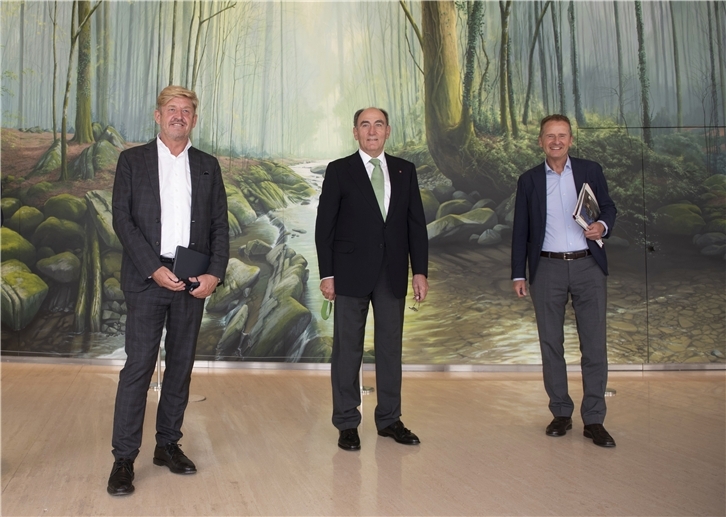News
-
31/03/2021We are releasing more carbon than ever. Only a grand global coalition can stop it Following an interview at the Financial Times Climate Capital Live event on Tuesday 30th March, and in advance of participation at the IEA-COP26 Net Zero Summit on March 31st, the chairman of Iberdrola group, Ignacio Galán, has called for a grand global coalition to tackle the climate crisis . Mr Galán points out that “scientific evidence shows that the only way to achieve the 2050 goals is to make radical changes immediately". During the pandemic, he explains, CO2 emissions have reached levels above those before the crisis, which sends a bad message about the European Union's goal of emission reduction. "What kind of message will we send about the possibility of achieving net zero emissions if we exceed 2019 emissions in 2021? " “It is no longer enough to say we are running out of time. The 2020s must be the decade of delivery on carbon emissions, he adds. For this, he points out, “government action alone is not enough”. “Private companies must also step-up, and back our pledges with investment”, such as the record 150 billion euros investment plan presented by Iberdrola for 2030. To this end, it is essential to continue adding support, such as the Green Deal reached by the EU, a sign of its leadership in this matter, or the historic Paris Agreement reached in 2015 and which the United States has re-joined. China, for its part, has announced its commitment to achieve carbon neutrality by 2060. “2050 is getting closer all the time”, Galán concludes. “What we do in 2021 must put us on track to meet the Paris targets. It is an opportunity we cannot afford to miss”. READ MORE
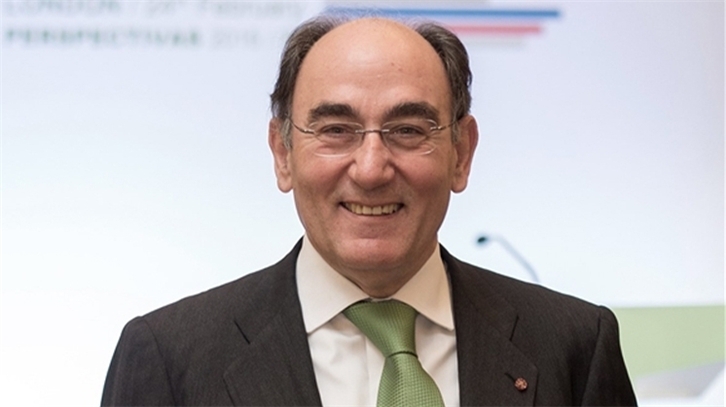
-
28/03/2021Iberdrola acquires three onshore wind farms in Poland, reinforcing commitment to this renewable energy market Iberdrola has increased its renewable energy footprint in Poland, one of the company’s new growth markets. The group has reached an agreement with CEE Equity Partner to acquire three new onshore wind farms with a total capacity of 163 megawatts (MW). The production from the facilities is largely already covered by 10-year power purchase agreements (PPAs). Two of the projects, with a joint capacity of 112.5 MW, are already operational, while the third one, with 50.4 MW capacity, will start construction shortly. The agreement reinforces Iberdrola’s commitment to Poland, strengthening the company’s position to be at the forefront of the energy transition in the country. It follows the recent acquisition of 70% of the developer Sea Wind, which has a pipeline of seven offshore projects with a potential capacity of up to 7,300 MW. The transaction is in line with the Iberdrola's growth strategy in countries with an "A" rating (amounting for over 75% of its Ebitda in 2020) and ambitious renewables targets: Poland plans to have 23% of its energy mix from clean energy by 2030 and commission 8,000 MW of offshore wind capacity in this decade. This new acquisition also boosts the company’s renewables Baltic Sea Hub which will act as a centre for offshore and onshore services, as well as providing local content for Iberdrola's projects in the Germany-Poland-Sweden axis. The Baltic has an offshore wind development potential of 93,000 MW, of which 28,000 MW would be located in Polish waters. Towards global offshore wind leadership The deal announced today reflects Iberdrola's strategy to consolidate its global leadership in wind power and comes on top of a dozen transactions completed over the past twelve months both in offshore and onshore wind. The company has strengthened its position in markets such as France, the United Kingdom, the United States and Brazil and new growth markets such as Australia, Japan, Sweden, Poland and Ireland. In onshore wind, the group's onshore wind pipeline exceeded 16,000 MW at the end of 2020, while its offshore portfolio stood at 19,000 MW of which 9,000 MW are ready for construction. Green investments to promote economic recovery For two decades, Iberdrola has been leading the energy transition, acting as a driving force in the green economic recovery, job creation and the transformation of industries. The company has launched a major €75 billion investment plan for the period 2020-2025 , with the aim of doubling its renewable capacity and seizing the opportunities of the energy revolution facing the world's leading economies. After twenty years promoting the energy transition, with investments of €120,000 million euros, Iberdrola is a leader in renewable energy, with an installed capacity of close to 35,000 MW, making its generation fleet one of the cleanest in the energy sector. With emissions of 98 grCO2/kWh, two-thirds lower than the European average, Iberdrola's strategy of investing in clean energy and grids will make it a carbon neutral company in Europe by 2030. READ MORE
-
28/03/2021Iberdrola and the Quadis dealership network ally to drive electric mobility Iberdrola and the Quadis dealership network have entered into an agreement whereby they will work together to promote sustainable mobility and self-consumption. The energy company will contribute solutions for installing charging stations at its premises, and the possibility of offering customers and employees who buy electric vehicles Iberdrola's comprehensive charging and self-consumption products. Quadis is Spain's largest network of official dealerships and repair workshops, representing more than 30 brands with a total of more than 100 points of sale and aftermarket businesses. In the framework of their collaboration, Iberdrola has already installed household charging stations in two showroom areas so that customers can see how these work. As well as providing the infrastructures necessary to charge electric vehicles and for self-consumption, the companies have also committed to some joint projects to encourage electric mobility as part of their commitment to implementing a more sustainable business model. Digital solutions for charging electric vehicles Iberdrola offers Quadis dealership customers its Smart Mobility solution, comprising a guaranteed charging infrastructure and installation. Customers can manage the solution in real-time, remotely from a mobile phone, using the applications designed by Iberdrola: the Iberdrola Public Charging app, the Smart Mobility Home app and the Smart Mobility Business app. What's more, customers and employees of these dealerships can charge their vehicle batteries with 100% green energy by Iberdrola, which comes from clean generation sources, since all these facilities have renewable origin guarantee certificates (GoOs). The charging points will also be available on the Iberdrola Public Charging App, the only one in Spain with verified information about all Iberdrola's public charging points and those belonging to other operators. With this app, you can geolocate the charger and reserve and pay from your mobile. Electric mobility and green recovery Iberdrola continues to push its stance on transport electrification as part of its strategy for a decarbonised economy, as a key factor in reducing emissions and city pollution, as well as for a green recovery in the post-Covid world. The company is implementing a sustainable mobility plan with an investment of 150 million euros, resulting in an increased roll-out of charging points for electric vehicles over the coming years. The initiative entails installing around 150,000 charging points in homes, companies and on the public road network in cities, as well as on the main motorways over the coming years. The commitment to deploying high-efficiency charging points will include the company installing ultra-rapid (350 kW) charging points every 200 kilometres, super-rapid points (150 kW) every 100 kilometres, and rapid (50 kW) points every 50 kilometres. Iberdrola is aware of the need to boost electric mobility in Spain through coordinated, effective action involving the major players. The company has, therefore, now completed more than 40 infrastructure roll-out agreements with government departments, institutions, companies, service stations, and electric vehicle dealers and manufacturers. Iberdrola has recently become the first Spanish business to subscribe to The Climate Group's EV100 initiative, with the aim of accelerating the transition towards electric vehicles with a commitment to electrifying its entire fleet of vehicles , enabling staff to charge their vehicles at its outlets in Spain and the United Kingdom by 2030. READ MORE
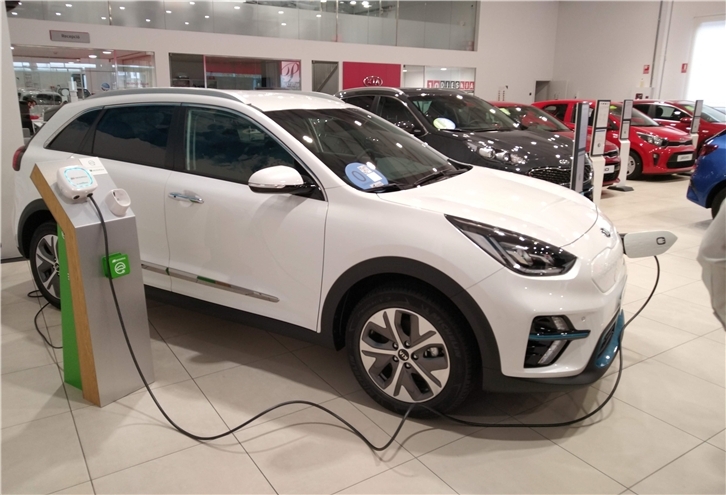
-
26/03/2021Iberdrola installs beehives near photovoltaic projects to preserve biodiversity and help drive the circular economy Iberdrola has installed 162 beehives at its Andévalo photovoltaic plant in Andalusia's Huelva province, with the aim of preserving biodiversity in the surroundings of its renewable developments and protecting species like bees, while at the same time moving forward in its strategy to decarbonise the economy. The initiative, undertaken alongside Tesela Natura, will also contribute to developing the circular economy, since as well as studying how growing aromatic plants increases honey quality, the honey will be available to buy from May, collected from the forest, eucalyptus, thousand flowers, thyme, rosemary and broom. The project will also be rolled out at the company's other photovoltaic plants in Spain and will show how introducing pollinators at renewable installations situated close to agricultural land can improve crop performance. It will also demonstrate the importance of bee pollination to the stability of ecosystems. At the Andévalo photovoltaic plant, bees are not exposed to pesticides, as weeds are controlled manually or by livestock. Bees pollinate more than 80% of the world's plants and more than 90 crop types. Currently, 75% of the food we eat depends on pollination. Located in the town of Puebla de Guzmán, the photovoltaic plant has more than 150,000 solar panels and prevents more than 15,000 tonnes of CO2 being emitted into the atmosphere each year. The 100% renewable energy it produces has for months now contributed to decarbonising the beer making process at Heineken's four breweries in Spain. Competitive, sustainable energy and environmental balance Iberdrola has fully integrated the conservation of biological diversity of ecosystems into its strategy, showing that it is possible to effectively combine supplying competitive, clean and sustainable energy with environmental balance. It plans to reach no net loss of biodiversity by 2030, and is committed to net positive impact in new infrastructure developments. Iberdrola has carried out over 1,450 actions to protect biodiversity in the last three years, combining the installation of renewable projects with the conservation of biological diversity in ecosystems, preserving flora, fauna and natural heritage. The company is aligned with meeting the sustainable development goals (SDGs) directly related to nature (SDGs 6, 13, 14 and 15) and works to promote economic and social development while respecting the environment . READ MORE
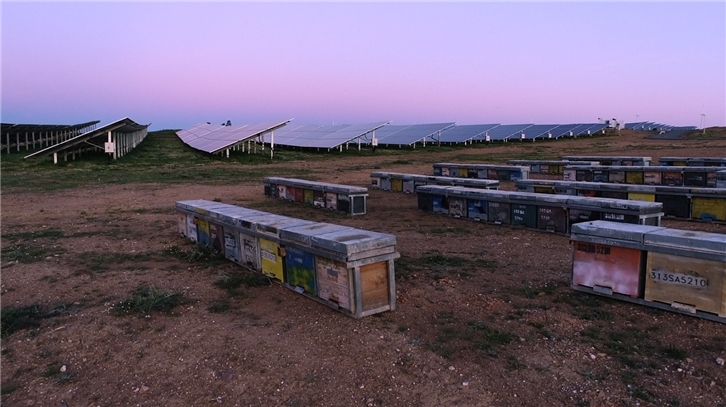
-
23/03/2021Ignacio Galán supports Europe’s leadership in the green recovery of industry and jobs Urgency and optimism. These are the two key messages stressed by the Chairman of Iberdrola, Ignacio Galán, during his speech at the opening session of the EU Clean Energy Summit, organised with the support of the European Commission and in which Executive Vice-President of the European Commission Frans Timmermans also took part. Galán stressed the need to act urgently so that Europe maintains its leadership in the transition to a low-carbon economy, driver of reindustrialisation and job creation: “We must do everything we can in this decade, we must be very ambitious and the time to do it is now. European leadership, key to the signing of the Paris Agreement, has already benefited the whole world and we must reinforce the work of recent years so that it translates into well-being and jobs for Europeans.” To this end, the continent already has massive social support, a strong political commitment to the European Green Deal, with the necessary technology and with companies prepared to invest massively. According to the Iberdrola Chairman, the necessary resources are also available, but, in this regard, “there will be massive competition and we have to use funds in an intelligent way, promoting sectors of the future and not of the past, to ensure that public resources rally private investment”. “We must put all our resources into zero-carbon technologies, not into technologies that will have a short life span. We must not think low-carbon, but zero-carbon. And in doing so we should always keep the social dimension in mind; if we do not work for a just transition, we will fail,” he added. As an example of future technology that is already available, he highlighted green hydrogen, which is key to electrifying industrial processes and heavy transport: “For example, we can already produce 100% clean fertilisers and ammonia but we can't wait any longer to extend low carbon technologies to other sectors, we must start now”, said Iberdrola’s chairman about the group’s commitment to this technology, one of its growth drivers for the next few years. The energy transition is therefore a great opportunity to recover Europe’s industrial leadership, build a stronger and more sustainable economy and generate quality jobs. Boosting innovation will be key in this process, as Ignacio Galán pointed out: “Traditionally, other major economies have invested more in innovation than Europe but we now have the opportunity to bridge this gap.” In this regard, according to the European Commission, Iberdrola is the leading private utility company in Europe in terms of investment in R&D&I and the second in the world. In the past decade, it has invested more than €2 billion in innovation and development and in 2020 alone it allocated close to €300 million as it is strategic for guaranteeing the company’s sustainability, efficiency and competitiveness. READ MORE
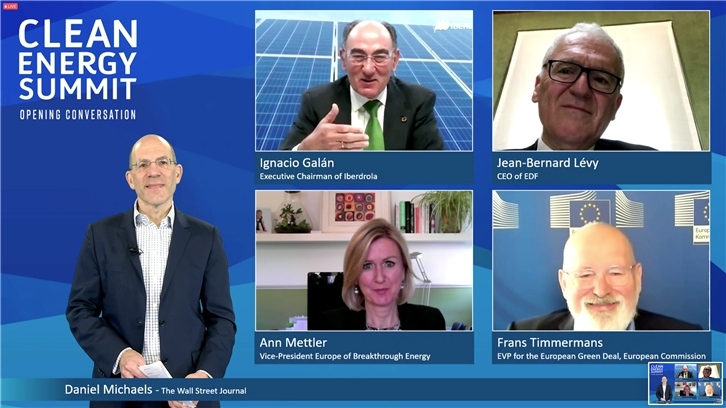
-
18/03/2021Iberdrola and the Ministry of Defence extend their collaboration in research and training programmes Iberdrola Chairman, Ignacio Galán, and Defence Chief of Staff (JEMAD), admiral general Teodoro E. López Calderón, representing the Ministry of Defence, have today signed a collaboration agreement with the aim of developing research and training programmes covering a number of areas of interest for both parties. The agreement ratifies the commitment on both sides to consolidate public/private R&D&i schemes to facilitate information exchanges, enable institutions to equip themselves with new tools to improve the fulfilment of their function, and enhance the competitiveness of businesses. This new accord includes the financing of educational activities, such as doctorates and masters, as well as the implementation of new technologies to develop virtual teaching in the Armed Forces. The partnership is an extension of the framework agreement signed by both organisations in 2015 through which various activities have been undertaken such as seminars on the challenges of climate change for defence, and workshops analysing the role of the Armed Forces and their collaboration with businesses in meeting the UN Sustainable Development Goals as well as the role of professional women in the Armed Forces and in civil society. In addition, a host of best practice exchange projects have been initiated with the Military Emergencies Unit, providing mutual technical and logistical support, and emergency simulations. During the signing ceremony at the headquarters of the Higher Centre for National Defence Studies (CESEDEN) - the main joint military teaching facility for the Armed Forces - Ignacio Galán declared:“it is very satisfying to be here today to renew this agreement reaffirming the dedication of the Armed Forces and Iberdrola to promote training and the updating of knowledge and to provide us with professionals and specialists capable of successfully tackling the new challenges of a world in a permanent state of transformation.” For his part, Admiral López Calderón said: “Iberdrola's ongoing support for the Armed Forces in different fields related to knowledge is a powerful tool for generating innovation in Spain. The permanent cooperation of Iberdrola with the Ministry of Defence has contributed to the enhancement of CESEDEN’s training work and, as a consequence, to innovation at the heart of the Armed Forces.” READ MORE
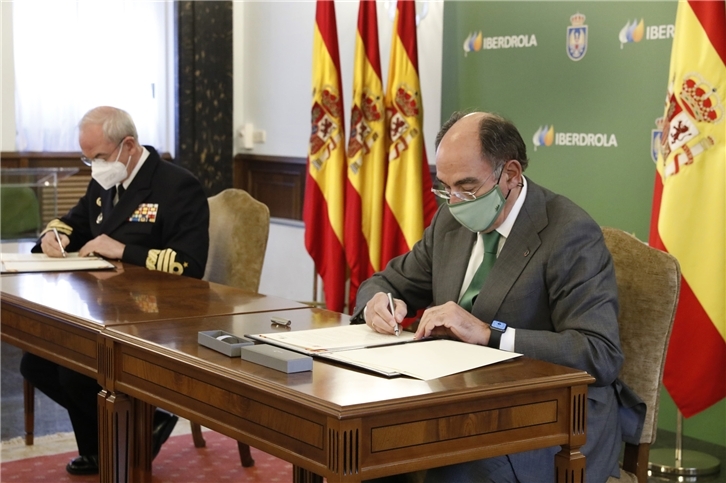
-
17/03/2021Iberdrola bolsters presence in Japan's offshore wind market with new 600 MW project Iberdrola has increased its commitment to the Japanese offshore wind market with a new 600-MW project, following the agreement with local developer Cosmo Eco Power (a subsidiary of Cosmo Energy Holdings Co. Ltd.) and engineering firm Hitz to jointly develop the Seihoku-oki project in Aomori prefecture, in the northwest of the country. The Seihoku-oki offshore wind farm, under development, will enter round 3 of the capacity auction planned by the Japanese government between this year and 2022. Following the transaction – subject to the usual regulatory approvals – the project will be led by Iberdrola and Cosmo Eco Power, with similar voting rights, together with Hitz. The deal takes place six months after the acquisition of 100% of Japanese developer Acacia Renewables – which has a 3,300-MW offshore wind pipeline in the south of the country. It is the company’s sixth offshore wind agreement since early 2020. Acacia Renewables has two offshore wind farms under development, with a combined capacity of 1,200 MW, which could be operational by 2028. It also has four other projects in the pipeline, with a total capacity of 2,100 MW. These six projects will be developed by Iberdrola together with Macquarie's Green Investment Group (GIG). A market with strong growth potential With these operations, in line with Iberdrola's strategy of leading the offshore wind market, the company will be able to compete in rounds 2, 3 and 4 – the last two scheduled for 2023/2024 – of the capacity auctions announced by the Japanese government, positioning itself in the initial development stages of a market with great growth potential. Japan's installed offshore wind capacity currently stands at around 70 MW but is set on a strategy to decarbonise its energy mix and promote energy independence. The market is scheduled to reach 30,000-45,000 MW offshore wind installed by 2040, according to the Government-Industry Dialogue Council for Offshore Energy. Both operations provide Iberdrola with an experienced team of market experts and renewable asset developers, as well as offices in Japan which will enable Iberdrola to lead on its own the development of new projects in the country. One of the group's main growth drivers The entry into a new offshore wind project reinforces Iberdrola's diversification strategy aimed at leading in this technology while consolidating its position as the world's largest renewable energy company. Offshore wind is driving the group's growth: with 1,300 MW capacity installed – Wikinger, East Anglia ONE and West of Duddon Sands – and 2,600 MW under construction which will increase current capacity three-fold. The existing pipeline totals 19,000 MW, of which 9,000 MW are ready for construction and 10,000 MW are being developed in markets such as the United States, Sweden, Japan, Poland and Ireland. In 2020, offshore wind projects contributed €585 million to EBITDA, after growing by 72%; this contribution will rise to €2.3 billion by 2030. Green investments to promote economic recovery and jobs For two decades, Iberdrola has been leading the energy transition, acting as a key driving force in the transformation of industries, the green recovery of the economy and job creation. To this end, the company has launched a record investment plan of €150 billion over the next decade – €75 billion by 2025 –, with which it plans to triple renewable capacity and double network assets while taking advantage of the opportunities of the energy revolution facing the world's major economies. Having invested €120 billion over the past twenty years, Iberdrola is a leader in renewable energy with nearly 35,000 MW installed capacity, a volume that makes its generation fleet one of the cleanest in the energy sector. With emissions of 98 grCO2/kWh, which already are two-thirds lower than the European average, the strategy of investing in clean energy and networks will allow Iberdrola to be "carbon neutral" in Europe by 2030. READ MORE
-
15/03/2021Iberdrola, Volkswagen and SEAT strengthen their partnership to accelerate electrification in Spain Iberdrola, SEAT S.A. and the Volkswagen Group have strengthened their commitment to electric mobility by signing a strategic alliance to promote electrification in Spain. The main objectives of the agreement, which was signed during the Power Day organised by the Volkswagen Group, are to supply renewable energy in the electric vehicle value chain and develop and create a public charging infrastructure network. Firstly, this strategic plan will see Volkswagen Group’s facilities in the Iberian Peninsula supplied with renewable energy . With this move the Volkswagen Group is taking a further step towards its goal of becoming an environmentally neutral company by 2050, in line with the Paris Agreement. The agreement makes Iberdrola the energy partner of reference, which will help the automotive group achieve these targets. The alliance, which can be extended to other countries, also calls for the supply of energy with guarantees of renewable origin and other energy solutions to the Volkswagen Group itself, SEAT S.A. and its end customers. Another key area of the agreementwill be the contribution to the development of the country’s charging infrastructure. The three partners estimate that, by taking into account the expected evolution of the electric vehicle fleet in Spain, the roll-out of a network of around 350,000 urban and interurban public charging points will be needed by 2030. Iberdrola is developing a public charging infrastructure plan that will ensure a sufficient number of charging points, including fast and ultra-fast charging (HPC), to serve the country’s main corridors and cities. “The agreement shows the potential of bringing industry leaders together to accelerate the decarbonisation of the economy and its enormous positive impact on the environment and biodiversity, as well as on economic recovery, strengthening the value chain and creating millions of sustainable jobs across Europe” said Iberdrola President Ignacio Galán. “We have the technology, capabilities, knowledge and determination to jointly create a more sustainable model for everyone and shape an ecosystem that enables our country to continue to lead in this area at European level. This strategic alliance represents a giant step forward on this path” concluded Galán. Volkswagen Group CEO and Chairman of the Board of SEAT S.A., Dr. Herbert Diess said. “With the signing of this agreement, we are laying the foundations for the future of electric mobility in the Iberian Peninsula in a definitive step towards its electrification. Spain has great potential to become a hub for electric mobility in Europe, and to do so, we need to transform the second largest European automotive industry”. In turn, SEAT President Wayne Griffiths stated that “we are at a historic moment in which we have the opportunity to pave the way for a sustainable industrial future in Spain. To do so, the first step is to create an ecosystem for electric vehicles, and public charging infrastructure is essential”. Iberdrola: Electrification, the basis for growth and the green economy a For the past two decades, Iberdrola has been demonstrating that the energy transition can act as a key driving force in the transformation of the industrial fabric and in the green recovery of the economy and employment. To this end, it has launched a historic investment plan of 150 billion euros by 2030 - 75 billion euros by 2025- with which it will triple renewable capacity and double network assets and take advantage of the opportunities of the energy revolution facing the world’s leading economies. In Spain, these investments amount to around 14.3 billion euros by 2025. After investments of 120 billion euros since 2021, Iberdrola is a global energy leader with an installed renewable capacity of 35,000 MW, making its generation capacity one of the cleanest in the energy sector. The company is rolling out a sustainable mobility plan, with which it will step up the installation of charging points for electric vehicles in the coming years, prioritising high-efficiency stations on corridors and motorways both in Spain and in other European countries. With emissions of 98 g CO2/kWh in 2020, which are already two-thirds lower than the European average, the strategy of investing in clean energy and grids will lead Iberdrola to be a “carbon neutral” company in Europe by 2030. Volkswagen Group and SEAT, promoting electrification in Spain This agreement is part of the work that the Volkswagen Group and SEAT S.A. have been carrying out in recent months to relaunch the Spanish automotive industry based on principles such as modernisation, added value, competitiveness, digitalisation, inclusiveness and training. To accelerate the development of an electric mobility ecosystem, the Volkswagen Group and SEAT S.A. aim to lead a project that will serve as a driving force for large and medium-sized companies, with the collaboration of key organisations in different sectors and with great potential for job creation, especially for young people. With the second largest car manufacturing industry in Europe, Spain has a major responsibility to reach the European Green Deal targets by 2030. For this, it is essential that Spain accelerates the creation of the electric vehicle ecosystem, stimulates demand and develops public charging infrastructure. READ MORE
